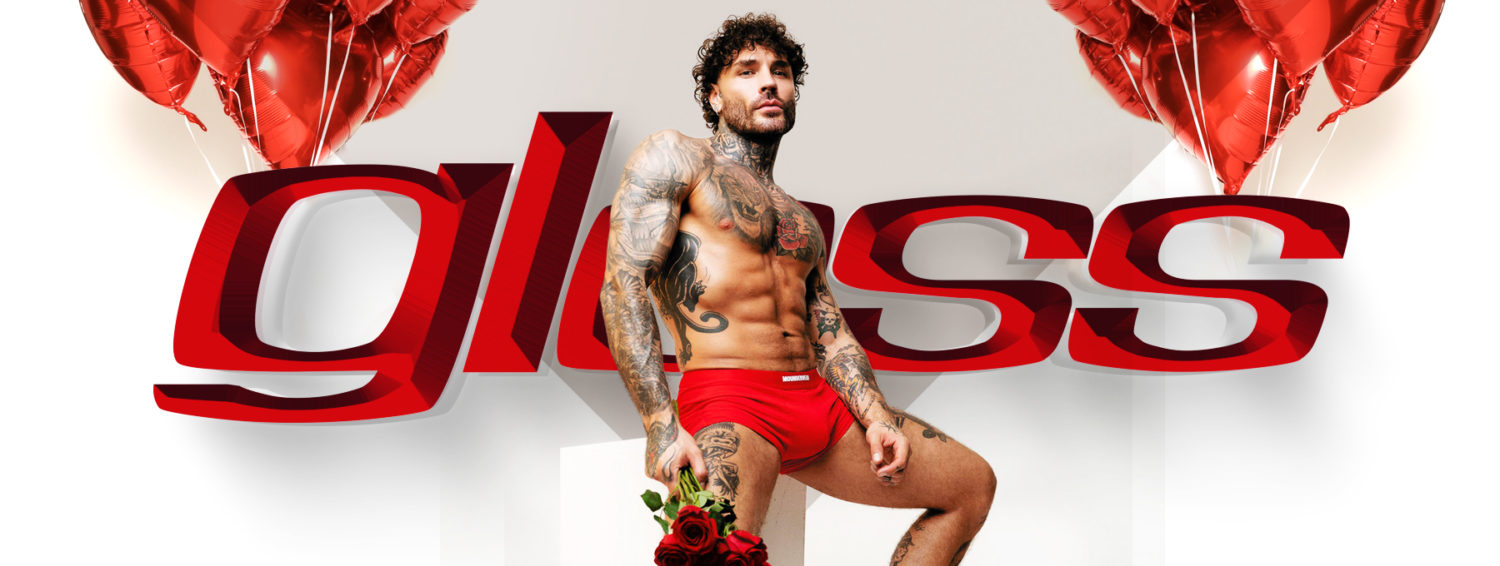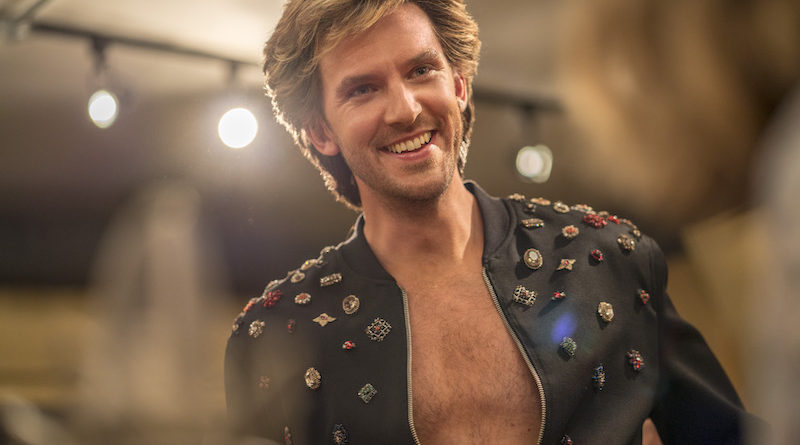Crazy Sexy Time with Dan Stevens
As closeted Russian pop prince Alexander Lemtov, actor Dan Stevens shows up in the Netflix comedy _Eurovision Song Contest: The Story of Fire Saga_ bejeweled in rhinestones, with a moppy head of Wham!-era George Michael hair. He gives double-cheek kisses. He gives invites to his “very crazy sexy” parties. Alexander’s extraness, and that he doesn’t see what other far-less-opulent people do, is the joke. He’s beyond out of touch with the ordinary person, like Lars (Will Ferrell) and Sigrit (Rachel McAdams), small-town Icelandic best friends who become accidental Eurovision contestants and enter into a sing-off against Lemtov.
Co-written by Ferrell, the campy musical is an outrageous love letter to the Eurovision Song Contest, an inescapable UK phenom. Alexander is certainly worlds apart from Stevens’s star-making turn in Downton Abbey and his breadth of chameleonic work, which includes the live-action remake of Beauty and the Beast, as the beast; the thriller The Guest; as a mutant with mind powers in the trippy FX series Legion, and, recently, in the Dave Franco-directed horror film The Rental.
As for Lemtov, this isn’t Stevens’s first time taking on a queer role. One of Stevens’s earliest roles, as Nick Guest in the The Line of Beauty, featured the actor as a gay man living in 1980s Britain during the height of the AIDS epidemic in the 2006 BBC miniseries adaptation of the Alan Hollinghurst novel of the same name.
For our recent interview, Stevens lost the Lemtov wig to reflect on portraying Nick Guest, and also talked about the safe place Eurovision provides contestants from anti-LGBTQ countries and, just for good measure, his favorite Cher songs.
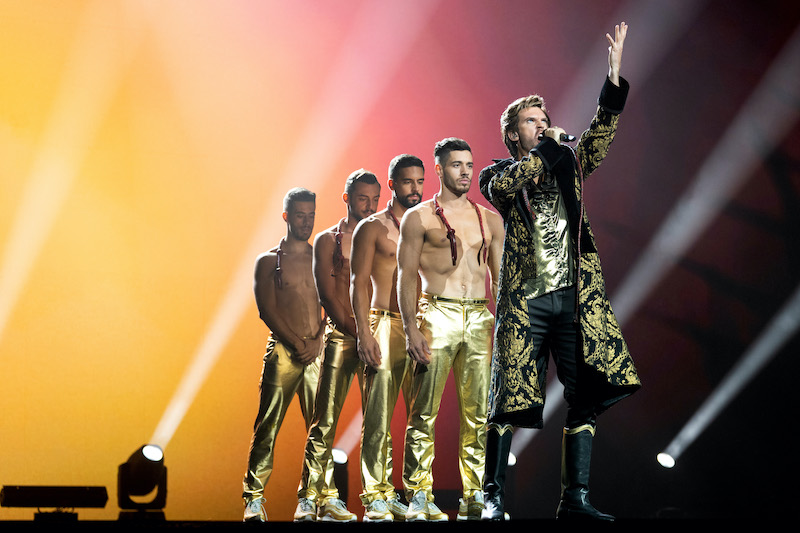
During what might be the gayest scene in Eurovision, you, along with the cast and former Eurovision contestant and drag queen Conchita Wurst, sing an epic medley of Madonna, Cher and ABBA. Can you name anything gayer that you’ve done in your life?
(Laughs.) It’s certainly up there! I don’t know if we can start ranking those, but most of those people coming out of the crowd were previous Eurovision contestants – and not all of them drag queens, it should be said. But yeah, amazing to have Conchita Wurst, Bilal (Hassani) and Jamala. It was an amazing list of former contestants, all of them incredible singers.
And yeah, to duke it out with those guys, and also with Will Ferrell and Rachel McAdams, was pretty surreal. I think for pretty much everyone involved in that sequence it was – I don’t know about the gayest moment of their life, but it was certainly one of the most surreal. And I’ve shown that sequence to a couple of, shall we say, Eurovision superfans who absolutely lost their minds at that sequence.
Is “Believe” your go-to Cher song?
I suppose it would be. I’m trying to think what else I would go for now. “Strong Enough.” “Fernando.” “Chiquitita.” “If I Could Turn Back Time.” I probably would do a medley! (Laughs.)
How did you navigate Alexander Lemtov’s campy-gay sexuality?
First and foremost, I went at it from that Euro-millionaire thing, which I’ve always found very, very funny. There’s a certain kind of campiness to those sort of mysteriously wealthy Europeans, particularly the Russians with the philosophy that if something is gold it must be best. Lemtov definitely has that kind of attitude.
It was very much inspired by a bizarre meeting I had once at a thing with Irina Shayk, the model. I met her in Manhattan and she asked me where I live, and at the time I was living in Brooklyn. She went (in a Russian accent), “Brooklyn. Too far.” And I said, “Well, OK, so where do you live?” And she just said, in one phrase, “West Village best place.” And I was like, “All right. OK.” (Laughs.) That sort of told me everything I needed to know about her outlook and just that sense of, when you just have that much money it shapes how you see the world, and also how that kind of warps your taste as well. And Lemtov has some pretty warped taste – both in the wardrobe and the home-decoration department.
George Michael’s name comes up at one point during the film. Did you tap into LGBTQ pop artists to get Alexander’s queer sensibility down?
I mean, the wig was very much inspired by George Michael. And there was a lot of trolling of hundreds of hours of Eurovision acts on YouTube. Just sort of the way that they work the camera is very interesting. There’s always the flying camera, and they kind of embrace it flying around them. If you know Eurovision, there’s always at least one country that submits an oversexualized, erotically choreographed number with fire and leather, so Lemtov is definitely from that school. There’s also a Russian crossover singer, a sort of opera-pop act called Philipp Kirkorov, who if you’re not aware of him a quick Google search will tell you all you need to know about him. He’s a really, really sweet man who’s a real sort of feature of Eurovision. He’s written a number of songs for Eurovision. I think he’s performed there at least once and he is a Russian superstar. Very, very friendly with Putin and apparently married with kids. But his wardrobe choice and his style might surprise you.
The film points out the dangerous living conditions that LGBTQ people face in Russia, and you recently talked about this with Attitude magazine. Did the country’s conservative views on queerness surprise you?
I think the way it was phrased in Attitude was like I had never even heard of these issues before and suddenly I was like, “Oh, wow, guess it’s really dangerous for them.” I was very aware of that. And I guess what I meant to say is, I wanted to be sensitive to that. You couldn’t really do a movie about Eurovision without touching on that subject; it’s famously a safe haven and a great champion of the LGBTQ+ community, and it has a huge fan base around the world for that very reason. One of the first trans performers in Israel winning a few years back. Conchita winning. Netta has a huge LGBTQ following. It really embraces that, and it’s a delight for that reason. And yet some of these performers come from countries where it’s dangerous to openly acknowledge their sexuality, and however silly our film is and however ridiculous Eurovision is, I think it’s really important to remember that.
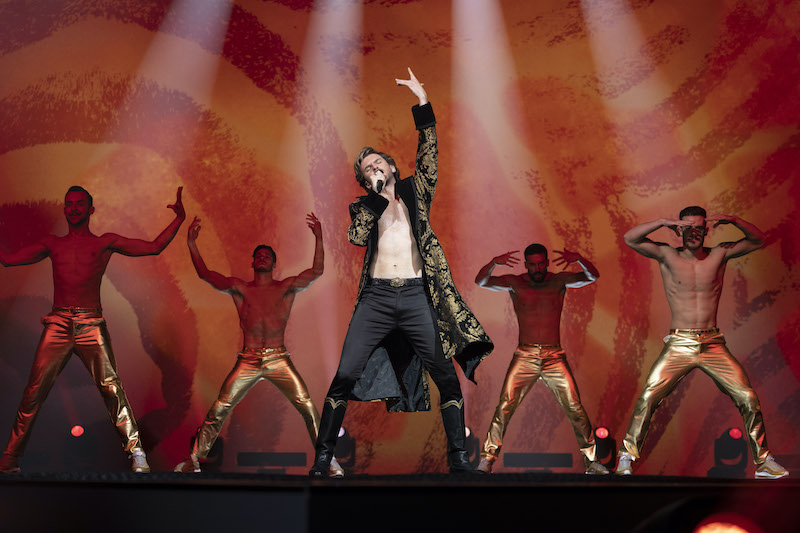
When it came to the campiness of the character, was avoiding queer caricature a concern?
I guess. I think historically there have been issues with that and with caricaturing, but you know, as we all know, there are as many different shapes and sizes of a queer person as there are of a straight person, so I think in the context of Eurovision, obviously Lemtov is a particular kind of performer. Whether he’s straight or gay, it’s sort of immaterial; he’s just that kind of guy, who’s just sitting on that much money with that kind of taste and is maybe not able to acknowledge fully who he is back home.
I think his need for Sigrit is a little different than we might expect. He’s not just the sleazy Lothario coming in to just kind of save Sigrit and break up (their band) Fire Saga. He’s got slightly more nuanced and complicated reasons for wanting her by his side.
How does he compare to other gay or queer characters that you have played in your career?
I mean, he certainly has a more interesting wardrobe than say Nick Guest in Line of Beauty. I don’t think Nick ever graduated to old-glamour camp. But to be honest, it never really occurred to me. I never sort of think, “I have had a quota of gay roles so I can’t take on another one.” Same with Line of Beauty. It was just an absolutely beautiful book and a beautiful adaptation, so it never really was an issue for me.
I believe I read that your first sex scene was in The Line of Beauty.
It was one of the first things I ever did, to be honest. But quite possibly. I haven’t been keeping count.
That’s what I’m here for.
(Laughs.) Yeah, right. You’ve got the league table there. You know, to be honest, when it comes to onscreen love scenes, they’re all fantasy scenes. They’re all made up. Me and whoever the other person is are not really together in real life, so you’re always entering into a fantasy scenario. The very nature of what I do is just sort of jumping into someone else’s life and exploring the world through their eyes, so it feels very much the same for me.
I think obviously gay actors have been playing straight roles for a very, very long time, and maybe not able to openly acknowledge their sexuality in the countries that they come from. I hope I’m not taking away roles from gay actors by playing gay roles. I think it’s just the nature of acting, really, that I don’t think we should necessarily have looked for a gay Russian actor to play Alexander Lemtov. You could still sort of leap into a role as an actor, within the realms of possibility.
Would you say that with The Line of Beauty you first became aware that you had LGBTQ fans?
I suppose that’s where it must’ve started. I mean, it is a really beautiful book and I think a very, very beautiful and sensitive adaptation as well.
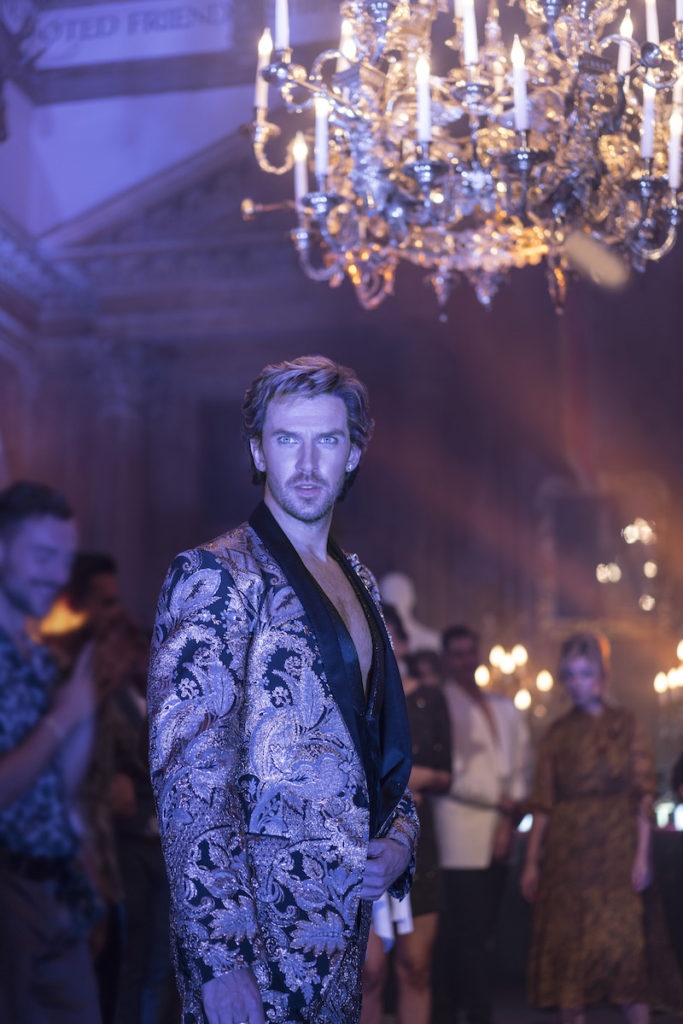
What was your introduction to the LGBTQ community?
I think it would’ve been in the National Youth Theatre in London. Growing up, I didn’t have many friends who were openly gay, and so I would’ve been about 15 when I first went to study – study is a strong word – but I got to go play with the National Youth Theatre and that’s the first time that, for many people involved, you’re meeting people from different backgrounds from all over the country, and all of them have this one thing in common: they love performing. And people from different ethnic backgrounds and different sexualities as well. It was a really, really eye-opening experience, and really fascinating. Some of those people are still my friends today. But yeah, it was a really valuable experience.
Which moment in your career helped court a bigger gay audience: you as a hairy beast or the scene when you come out of the shower in The Guest?
(Laughs.) I mean, you’d have to look at your league table for that one. I don’t have the stats on that.
A film you starred in, Permission, took a hard look at monogamy and prominently featured a gay couple. Is LGBTQ representation important to you when you’re considering a project?
Yeah. I mean, that one was particularly interesting because an old friend of mine, Brian Crano, who is himself a married gay writer and director, and David Craig, who is in the film, is his husband and that film very much came out of conversations that – not just between myself and Brian but Brian and his circle of friends – have had in the years running up to that movie. Just about relationships in general, not just LGBTQ, but about life partners and sexuality.
I thought it was a really interesting film in terms of how nuanced the discussion was and the questions raised in it. It wasn’t clear cut. And it’s not clear cut. I think that’s the thing. I think everyone wants sexuality to be black and white and it’s just not. And everyone wants marriage to be that as well and it’s just not. And I think Brian is particularly sensitive to that. He introduced me to Dan Savage and the Savage Love podcast many, many years ago and I’ve been a very, very long-time listener. I’ve never called in, not yet.
What would you ask Dan Savage?
Oh god, the list is so long. But I’m a huge, huge fan of Dan Savage and what he has done, not just for the LGBTQ community but actually just for people in general in their relationships. And particularly in the early days. It’s gotten a little less out there, I would say, the call-ins. Or maybe it’s that I’ve gotten less sensitive to some of these things!
And about those dance-offs on your show Legion: What problems would you solve right now if problems could be solved by psychic dance-offs?
(Laughs.) I mean, that is a great question. Psychic dance-offs could solve all sorts of things right now. And actually I’ve seen in the streets, during some of the protests that have been going on all over the place, that some people have taken to sort of collective dancing and I think that that might actually be a way forward.
